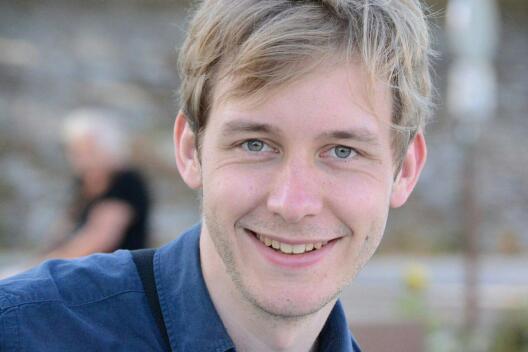PhD to PhD: Markus Schmetkamp

Markus Schmetkamp is in the final phase of his doctorate and shares his experiences from his doctoral studies in this interview. His thesis deals with coarse versions of the Farrell-Jones conjecture and he is supervised by Arthur Bartels.
Why did you choose Münster for your PhD?
I already studied mathematics in Münster. I like the city very much. I also got to know the working group and my advisor early on.
How was the beginning of your PhD and what would have been nice to know beforehand?
I talked with my advisor about some topics and got an office. In the beginning, I didn't really know what to do. The only thing I could do was reading and trying to understand some basics. It took a while until I got to a point where I was working in a way I do now. I guess it is very usual that it takes time to gain the knowledge and experience to have own ideas and be able to prove stuff etc...
How did you find your research topic?
My advisor had a rough idea of a theorem I should prove. It took several months until I understood what the content of that theorem could be. It got a lot better over the time and in later phases I had my own ideas of theorems worth proving. In the end my research topic is a combination of both: the idea of my supervisor and one of my own ones.
How was your supervision up to this point and how is the relationship to your supervisor?
I am very satisfied with my supervision. Many times, I got stuck. In those situations, I tried to summarize my problems and went to my advisor. It helped all the times. In the beginning I often had difficulties with some basics and he could easily explain things to me (he was never annoyed if I asked the same questions or if I didn't seem to understand the simplest basics). Later, I did more explaining than my advisor as I became an expert in my field. Then it was the talking about problems and exchanging ideas that helped me make progress.
What would you like to have done differently during your PhD?
At some point I started using git as part of making backups. I wish I had used that earlier and even more I wished I had used it properly. There were many times that I updated whole parts of my dissertation because results had to be stated more generally. Sometimes I went into a wrong direction. Sometimes I realized that what I did before was not so bad after all. A proper version control helps a lot of keeping track of such things.
How was the final phase of your PhD? How much time should you take for things like proofreading and printing?
Please give me the answer to that! I am almost finished writing down my thesis. I hope I have not forgotten any important details. Also, there is always the fear of having made a crucial mistake and everything falls apart when it is too late. I still need to write the introduction, implement a good structure to make the thesis readable and proofread everything. I guess stuff like that always needs more time than one expects.
How long should a PhD thesis be?
I think the length is not important. The content is. My own thesis tends to be very technical at many places. Therefore, it is quite long. In the end I expect about 120 pages.
Where will you be going to afterwards?
After my PhD I will not continue with math. I enjoyed the time and regret nothing. However, I realized that I am not really interested in current research as I am unable to see the motivation for most research questions. I am not sure where I am going but I still have some time to figure that out. As I heard from others one should not wait too long with looking for a job if one wants to find a fitting one.

